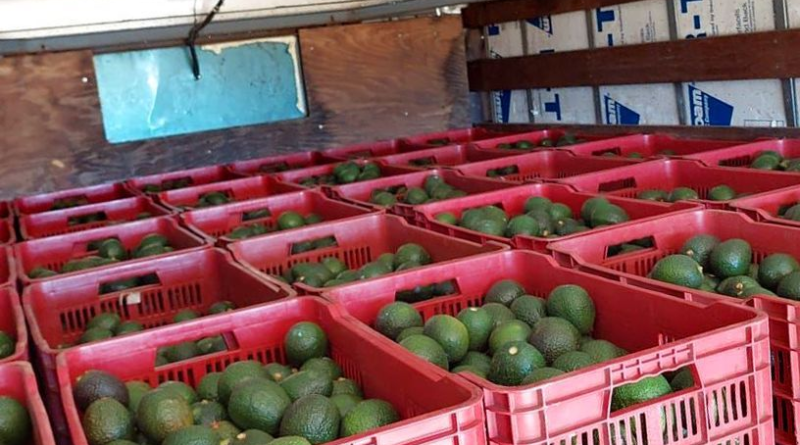Where do the avocados for Super Bowl guacamole come from? One state in Mexico
In the Mexican state of Michoacán, celebrations around this time of year center on the guacamole bowl instead of the Super Bowl.
That’s because each year, the premier sporting event in the U.S. serves as the main source of income for hundreds of families south of the border who ensure that 138,000 tons of avocados are ripe in time for kickoff on Super Bowl Sunday.
Millions of fans plan to enjoy the Feb. 11 matchup pitting the San Francisco 49ers against the Kansas City Chiefs at Las Vegas’ Allegiant Stadium with a side of guacamole. Much like Sunday’s opponents, the avocado trekked through its own challenging path to arrive at the party.
“The Super Bowl serves as the avocado fiesta because that’s when we all celebrate it,” said Héctor Avilés, general manager of Abokados, Mexico’s top avocado packing plant. “In Michoacán, [the avocado is] celebrated on that day because there was a lot of work involved in the weeks leading up to it, and in the U.S. because it’s on their table. I imagine cheese was once the top staple for families who watched the Super Bowl, but we know now that it’s avocados from Michoacán.”
About 80% of the avocados shipped to the U.S. from Mexico come from Michoacán. Kickoff for Super Bowl avocado season in the state — located in west-central Mexico about 1,600 miles from Las Vegas — took place six weeks before the actual game. Entire populations dedicated their days to several facets of production: planting, picking, packing and everything therein before the fruit embarked on its U.S. journey.
“There are entire families who pick, or others in which every member works at the packing plant,” Avilés said. “There are communities that benefit over a sustained period during these difficult times, made [even more difficult] in recent years because of the excessive influence of organized crime. I don’t know what would become of Michoacán if not for agribusiness. A lot of people would be on the wrong side of things. This gives them work and keeps them on the right side.”
A winding path to the north
During Super Bowl season, a truck leaves Michoacán every seven minutes, each carrying 132,000 avocados on their way to the U.S. Such a load of avocados has a value of approximately $80,000 to $100,000, and passes through areas of the country where the travel safety index drops considerably. Michoacán and Guanajuato, just to its north, were cited by Mexican authorities as two of the five least safe states in the country in 2023.
Once the cargo makes its way to the U.S., Avilés said, the shipping container is sealed to prevent tampering, and the truck is certified by American and Mexican inspectors. The cargo eventually reaches the northern city of Reynosa, Tamaulipas, just across from the Texas city of McAllen and one of the primary commercial crossing points along the U.S.-Mexico border.
“It’s checked again once it arrives,” Avilés said. “There’s an inspector at every border checkpoint, so you can pass through anywhere.”
Most of the product is shipped toward checkpoints in Texas, Arizona and California. If it is shipped to the Reynosa checkpoint, the cargo passes through Michoacán, Guanajuato, San Luis Potosí and Tamaulipas before reaching the border, a trip that takes about 12-14 hours during the day.
Along the way, the threat of the cargo falling into the hands of criminal organizations always looms. On average, distributors lose eight to 10 shipments a year — up to $1 million worth of avocados. The cargo is rendered useless and loses all value if the container is unsealed before reaching the U.S.
Because of this danger, the cargo is provided with an escort during certain seasons when the price of avocados is high.
“You can take all necessary precautions so long as you comply with Mexican and foreign protocols, which are to not open the truck until it reaches its destination,” Avilés said. “They seal it and you can’t open it.”
Avilés recalled a few lost shipments in 2023 but added that the company lost eight the year before.
“A criminal cell takes the cargo but leaves the truck. The entire shipment is loaded onto another truck in five minutes,” he said. “They’re incredibly skilled.”
From a ban to a boom
Because of issues with larvae, Mexican avocados were prohibited from entering the U.S. just 25 years ago. Today, the avocado is one of Mexico’s top three exports to its northern neighbor, with a typical year-over-year sales increase of up to 25% during the period from September to March. The boom wouldn’t be possible without detailed protocols and security escorts that safeguard production at every step.
The strict process is necessary to trace the origins of each batch that is shipped north.
“It doesn’t matter where the packing plants are. There’s a procedure, which our U.S. counterpart also follows, that tracks the process at all times,” Avilés said. “We don’t work by ourselves. They have to send us a dedicated inspector, 24 hours a day, to make sure that everything complies with U.S. standards. Mexico too, they send another inspector.”
An avocado tree takes from five to 10 years to mature and bear fruit. The orchard where it is cultivated is always monitored, from the time it is a mere fistful of dirt to when the avocados it produces reach their point of sale in the U.S.
In Michoacán, the process is a total team effort. Picking begins at 7 a.m. and ends at sunset. From there, the harvest heads to the packing plant, where each and every avocado must be handled by a person. Next is loading, where it takes at least 200 workers to fill one truck for transportation across the Rio Grande.
“We need the pickers in the field, that’s a team of nine people,” Avilés said. “The crates are taken out at the orchard, and from there they go to packing. That’s where a lot of hands need to be on deck. It’s an artisanal process vital to quality control.”
After the avocados are loaded, the freight truck transports the cargo in refrigerated containers to the U.S.
“We’re very inclusive in the packing process. We give jobs to people from humble origins whose skill is very valuable. They don’t even know what a Super Bowl is,” Avilés said. “What they do know is that it’s a busy work season and it’s when they receive the most income.”
Football and avocados: A joint celebration
The avocado rush reaches its peak in February, with the fruit’s green gold mined by consumers in the U.S. just as the NFL season reaches its conclusion. Orchards continue operating and producers keep making sure that the fruit is ready for the Super Bowl. The avocado’s perishable nature prevents more product from being sold within that period, Avilés said, keeping vendors from buying it months in advance.
An avocado exported to the U.S. ranges from 4 to 8 ounces in weight. California, a significant producer of the fruit, is nevertheless the main consumer of Michoacán avocados. However, Avilés said Texas is the top buyer and receives the most product from Mexico. It is the closest entry point from Michoacán to the United States, and a breadth of companies there handle distribution domestically to various points within the country.
Sunday’s kickoff at Allegiant will signal the end of the busy avocado season in Mexico. No doubt a good chunk of the millions watching on television in the U.S. will be enjoying a tasty bowl of guacamole oblivious to the process that delivered the snack to their table.
“The avocado holds a special place in our hearts,” Avilés said. “We know it’s a delicious fruit. It’s one of the top inflows of foreign currency into this country. In Michoacán, it’s like a religion, a blessing. Hundreds of thousands of us work in this market. The avocado has become our way of life.”




